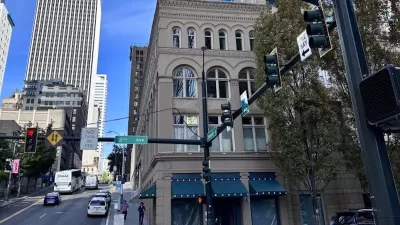In a recent address to the Conference on Economic Opportunity and Inequality, chairwoman of the Federal Reserve Janet Yellen portrayed the stark inequalities growing within American society.
As discussed by John Cassidy in The New Yorker, Janet Yellen's opening remarks to a conference in Boston were entirely devoted to outlining inequalities in the United States. As Yellen stated, "It is no secret that the past few decades of widening inequality can be summed up as significant income and wealth gains for those at the very top and stagnant living standards for the majority. I think it is appropriate to ask whether this trend is compatible with values rooted in our nation’s history, among them the high value Americans have traditionally placed on equality of opportunity."
While the Great Recession had a sharp impact on top incomes as a result of the declining stock market, those inequalities since then have resumed widening, with 2013 inequality levels at nearly those of peaking pre-recession times. As Cassidy writes, "Turning to wealth, which includes financial assets, real estate, and durable goods, such as cars, Yellen noted that the pattern was the same—except the increase in inequality had been even more stark. In 1989, the richest five per cent owned fifty-four per cent of over-all wealth. By 2010, that figure had risen to sixty-one per cent. And by 2013, it had reached sixty-three per cent."
In addition to touching on the net worth (debts, and mortgage debts subtracted from the summed value of all assets a family owns) of top Americans, Yellen discussed how "[i]n 2013, the average net worth of the sixty-two million households in the bottom half of the distribution was eleven thousand dollars."
Yellen went on to describe how the entrepreneurial spirit of America leads to people founding their own businesses, and moving up the income distribution, is also in trouble, "it appears that it has become harder to start and build businesses... The pace of new business creation has gradually declined over the past couple of decades... [and] may well threaten what I believe likely has been a significant source of economic opportunity for many families below the very top in income and wealth."
FULL STORY: Rising Inequality: Janet Yellen Tells It Like It Is

Montreal Mall to Become 6,000 Housing Units
Place Versailles will be transformed into a mixed-use complex over the next 25 years.

Planetizen Federal Action Tracker
A weekly monitor of how Trump’s orders and actions are impacting planners and planning in America.

DARTSpace Platform Streamlines Dallas TOD Application Process
The Dallas transit agency hopes a shorter permitting timeline will boost transit-oriented development around rail stations.

Interactive Map Reveals America's “Shade Deserts”
Launched by UCLA and American Forests to combat heat-related deaths, the tool maps the shade infrastructure for over 360 U.S. cities.

Bicycles and Books — In Sacramento, Libraries Now Offer Both
Adult library card holders can check out e-bikes and e-trikes for up to one week.

Colorado Landfills Emit as Much Pollution as 1M Cars
Landfills are the third-largest source of methane pollution in Colorado, after agriculture and fossil fuel extraction.
Urban Design for Planners 1: Software Tools
This six-course series explores essential urban design concepts using open source software and equips planners with the tools they need to participate fully in the urban design process.
Planning for Universal Design
Learn the tools for implementing Universal Design in planning regulations.
City of Mt Shasta
City of Camden Redevelopment Agency
City of Astoria
Transportation Research & Education Center (TREC) at Portland State University
US High Speed Rail Association
City of Camden Redevelopment Agency
Municipality of Princeton (NJ)





























